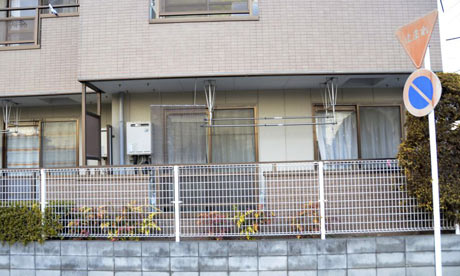Since when is this a Government failure--???--Family of three dies from apparent starvation in Japan
Discovery raises questions over the official response to rising poverty levels among the elderly and the unemployed in Japan

The apartment building in Saitama, near Tokyo, where three bodies were discovered by police. Photograph: Tatsuro Sugiura/AP
Authorities in Japan are under pressure to explain how three members of the same family were allowed to die of apparent starvation, after their bodies were discovered two months after their deaths.
Police found the bodies of a couple believed to be in their 60s and their son, thought to be in his 30s, at their apartment in Saitama, north of Tokyo, after the building's owner said he had been unable to contact them.
Officers entered the apartment to find the victims' badly decomposed corpses lying on futons, along with the carcass of their pet cat. The fridge was empty, the cupboards contained very little food, and a few one-yen coins appeared to all the money they had.
The discovery has raised questions over the official response to rising poverty levels among the elderly and the unemployed in the world's third-biggest economy.
As far as welfare officials in Saitama were concerned, the family, residents of a city of 1.2 million, had simply ceased to exist.
The victims appear to have been left to fend for themselves, despite their failure to pay their rent and utility bills. The cause of death is still unknown, but officials believe they either starved or committed suicide.
The family was not on a list of vulnerable households that are regularly visited by officials from the city's government. Some neighbours were unaware the apartment was even occupied.
Local media reports suggest the family was too ashamed to admit they needed financial help. When approached by the firm that manages the apartment, the woman reportedly said her son was working and her husband was unable to work due to chronic back pain.
A neighbour had tried unsuccessfully to persuade the wife to contact welfare authorities after she asked for money at the end of last year, saying the family was "in trouble".
Experts voiced disbelief that the authorities had not been informed, even after the family failed to pay rent for six months and had their gas and electricity cut off. They had reportedly not received welfare payments since 2003, two years after they moved into the apartment.
"Some people have a resistance to the idea of receiving welfare or contacting local authorities," Takehiro Yoshida, a welfare lawyer, told the Asahi Shimbun newspaper. "Others are left isolated in their own communities."
Yoshida called on utilities to report cases of repeated non-payment of bills to welfare agencies.
Tokyo Electric Power and Tokyo Gas have said they do not assume poverty to be the cause of non-payment, and do not notify welfare agencies unless asked to do so by the residents themselves.
Despite enjoying one of the highest standards of living in the world, Japan is struggling to address rising rates of poverty, particularly among the elderly and disabled, a growing number of whom die in complete isolation.
In the summer of 2010, a 76-year-old man in Saitama died of heatstroke after his electricity was cut off for non-payment.
Last month, two sisters in their 40s, one of whom had a mental disability, were found dead in their freezing apartment in Japan's northernmost prefecture of Hokkaido. An 84-year-old man living in the same region was found dead alongside his wife, who had been suffering from Alzheimer's.
More than 700 people have died of apparent starvation since 2000, according to the health ministry. Fears are growing that job losses among middle-aged men and the impact of the 11 March disaster will push the number higher in the coming years.
"This is not something you'd expect in a developed country like Japan, but people are struggling to find jobs," ABC News quoted Norimichi Goishi of the Tokyo Institute for Municipal Research as saying.
"Local officials can't always reach those in need. Deaths related to starvation are a lot more common than we think."
No comments:
Post a Comment